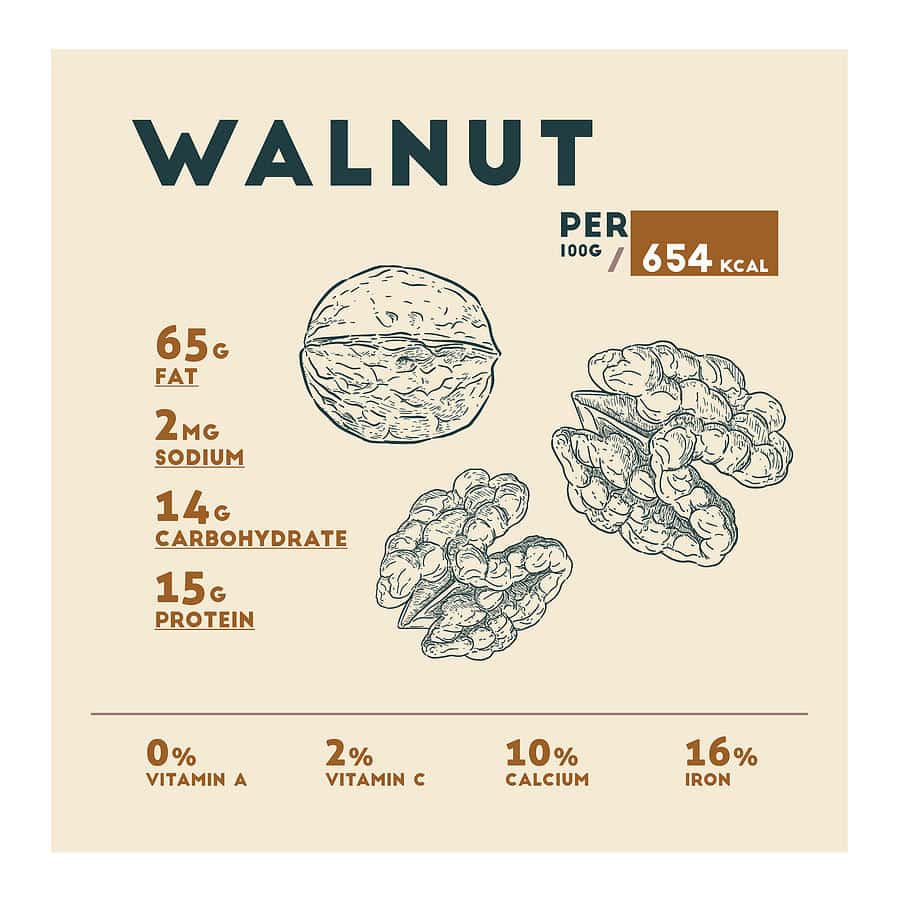Walnuts, often hailed as a superfood, are gaining traction in the health-conscious world. These small, brain-shaped nuts are not only a delight to the palate but also a powerhouse of nutrients. With an increasing number of people turning towards natural and healthy eating habits, understanding the benefits of walnuts becomes essential. This article gives you some insight into the various reasons why you should eat more walnuts and how it can be a game-changer for your health. From their nutritional composition to their impact on chronic diseases, walnuts offer a multitude of benefits that are too significant to overlook.
Nutritional Profile of Walnuts

Walnuts are a rare plant source of Omega-3 fatty acids, which are crucial for maintaining brain health. These essential fats, particularly alpha-linolenic acid (ALA), play a significant role in neurological development and cognitive function. Regular consumption of walnuts has been linked to better brain health, including improved memory and faster processing speed. Unlike other nuts, walnuts provide a substantial amount of these healthy fats, making them an ideal choice for vegetarians and vegans seeking Omega-3 sources. Moreover, the anti-inflammatory properties of these fatty acids contribute to reducing the risk of chronic inflammatory diseases.
Packed with antioxidants, walnuts stand out among other nuts for their ability to combat oxidative stress. They contain a high concentration of antioxidants like vitamin E, melatonin, and polyphenols, which are particularly concentrated in their skin. These compounds help neutralize harmful free radicals, thus preventing cellular damage. The antioxidant profile of walnuts not only aids in fighting oxidative stress but also reduces the risk of chronic diseases, such as heart disease and cancer. Regular inclusion of walnuts in the diet can significantly contribute to overall antioxidant intake, enhancing the body’s defense mechanisms.
Heart Health Benefits

Walnuts have a remarkable ability to positively influence cholesterol levels. They are known to reduce low-density lipoprotein (LDL) cholesterol, often referred to as ‘bad’ cholesterol, which is a major risk factor for heart disease. Studies show that consuming walnuts regularly can lead to a significant decrease in LDL cholesterol levels, thanks to their high content of mono- and polyunsaturated fats. These healthy fats replace less healthy fats in the diet, leading to a more favorable lipid profile. Additionally, the presence of Omega-3 fatty acids in walnuts further aids in improving heart health by reducing inflammation.
Apart from managing cholesterol levels, walnuts play a vital role in maintaining healthy blood pressure. They contain the amino acid l-arginine, which offers multiple vascular benefits to people with heart disease or those who have an increased risk for heart disease due to multiple cardiac risk factors. Walnuts also contribute to the dilation of blood vessels, ensuring smooth blood flow and reducing the risk of plaque buildup. Including walnuts in one’s diet has been associated with modest decreases in blood pressure, both systolic and diastolic. This effect is particularly beneficial for those struggling with hypertension, offering a natural way to manage their condition.
Weight Management and Walnuts

Integrating walnuts into your diet can be a strategic move for weight management. Their high fiber and protein content make them particularly satiating, helping to control hunger and reduce overeating. When consumed as part of a balanced diet, walnuts can help maintain a feeling of fullness for longer periods, preventing unnecessary snacking. The fiber in walnuts not only aids in satiety but also supports digestive health, adding another dimension to their weight management benefits. This makes walnuts an excellent snack choice for those looking to maintain or lose weight, as they provide essential nutrients while keeping calorie intake in check.
Walnuts also contribute to a healthier metabolism, crucial for weight control. The presence of essential fatty acids in walnuts plays a role in optimizing metabolism. Furthermore, these nuts are rich in minerals like magnesium and copper, which are involved in various metabolic processes in the body. Including walnuts in your diet can help in enhancing the metabolic rate, thus aiding in more efficient calorie burning. Not to mention, the protein in walnuts helps in building and maintaining muscle mass, which is essential for a healthy metabolism. Eating walnuts can, therefore, be a beneficial addition to a weight management plan, offering both nutritional value and metabolic advantages.
Brain Health and Cognitive Function

Walnuts are increasingly recognized for their positive impact on brain health and cognitive function. The Omega-3 fatty acids found in walnuts are essential for maintaining brain health, particularly as you age. These fatty acids contribute to the maintenance of normal brain function, including memory and thinking skills. Studies have shown that regular consumption of walnuts can lead to improved cognitive performance, potentially reducing the risk of neurodegenerative diseases like Alzheimer’s. Additionally, the antioxidants in walnuts protect brain cells from oxidative stress and inflammation, further supporting cognitive health.
Walnuts may also play a role in improving mood. They are one of the few nuts that contain a significant amount of the amino acid tryptophan, a precursor for serotonin, a neurotransmitter that helps regulate mood. Adequate levels of serotonin are associated with a reduced risk of depression and anxiety. Studies have indicated that regular intake of walnuts can lead to better mood states and lower rates of depression. This mood-enhancing property of walnuts, coupled with their cognitive benefits, makes them an excellent dietary addition for those looking to support their mental health.
Walnuts for Skin and Hair Health

Walnuts are not just beneficial for internal health but also play a crucial role in maintaining healthy skin and hair. The rich array of nutrients, such as Omega-3 fatty acids, vitamins, and antioxidants, contribute significantly to skin health. These nutrients help in reducing inflammation and oxidative damage, which are key factors in preventing skin aging and promoting a healthy complexion. The presence of biotin (Vitamin B7) in walnuts also aids in strengthening hair and reducing hair fall. Regular consumption of walnuts can lead to smoother, more radiant skin and stronger, healthier hair.
Walnuts’ anti-inflammatory properties are particularly beneficial for skin conditions like eczema and psoriasis. The Omega-3 fatty acids help in managing these conditions by reducing the inflammation and irritation associated with them. Moreover, the antioxidants in walnuts, such as Vitamin E, protect the skin from environmental stressors like UV rays and pollution, which can lead to premature aging. For hair health, the Omega-3 fatty acids in walnuts nourish the hair follicles, promoting hair growth and preventing scalp dryness. Including walnuts in your diet can thus be an effective natural strategy for enhancing both skin and hair health.
Cancer Prevention and Walnuts

Along with the benefits they can bring to your daily life, walnuts have been identified as having potential cancer-preventing properties. Research suggests that regular consumption of walnuts may reduce the risk of certain types of cancer, including breast and prostate cancer. The anti-inflammatory and antioxidant properties of walnuts play a significant role in this regard. These properties help protect cells from DNA damage, a precursor to cancer and inhibit the growth of cancer cells. The high content of Omega-3 fatty acids, along with other bioactive components in walnuts, contributes to their cancer-preventive effects.
Studies have specifically looked at the impact of walnuts on breast and prostate cancer, with promising results. In the case of breast cancer, the compounds in walnuts have been found to slow down the growth and spread of cancer cells. Similarly, for prostate cancer, walnut consumption has been linked to reduced tumor growth. These findings suggest that including walnuts in one’s diet could be a part of a proactive approach to cancer prevention. While they are not a standalone cure or prevention method, walnuts offer beneficial nutrients that can support overall health and potentially reduce cancer risk.
Walnuts in a Balanced Diet

Incorporating walnuts into a balanced diet is both simple and beneficial. As versatile as they are nutritious, walnuts can be added to various meals and snacks. They can be sprinkled on salads, blended into smoothies, or used as a crunchy topping for yogurts and oatmeal. This ease of inclusion makes it convenient to reap the health benefits of walnuts daily. When adding walnuts to your diet, it’s important to consider their caloric density. While highly nutritious, they are also high in calories, so portion control is key to enjoying their benefits without overindulging.
Balancing nut intake is crucial in a healthy diet. While walnuts are incredibly beneficial, consuming a variety of nuts ensures a broader range of nutrients. Each type of nut has its unique composition of vitamins, minerals, and other beneficial compounds. For instance, almonds are high in Vitamin E, while cashews offer a good source of magnesium. By including a variety of nuts in your diet, you can enjoy the diverse health benefits they offer. With their distinctive nutritional profile, walnuts should undoubtedly be a part of this mix, contributing to a well-rounded, nutrient-rich diet.
Make Walnuts Your Go-To Superfood
In light of the numerous benefits walnuts offer, incorporating them into your daily diet is a wise and delicious choice. These nutrient-rich nuts not only enhance your health but also contribute to a more balanced and wholesome lifestyle. Whether it’s for better heart health, cognitive function, or one of the many other benefits, walnuts are a simple yet effective addition. Start exploring creative ways to include walnuts in your meals and snacks. Let this be your first step towards embracing a more natural, health-oriented approach to eating, with walnuts leading the charge.


